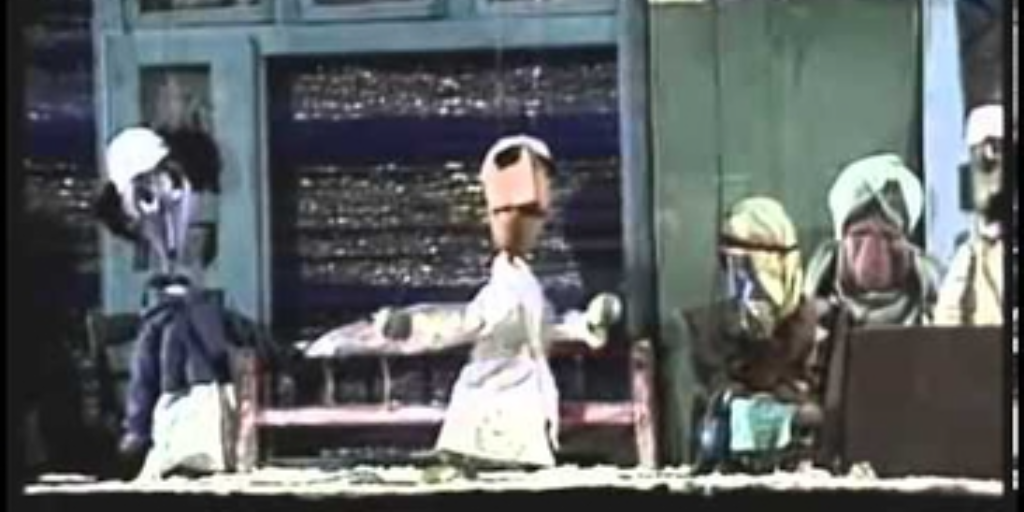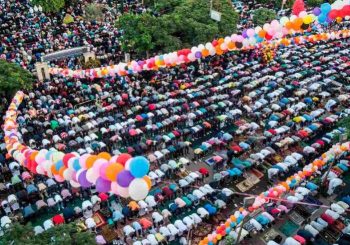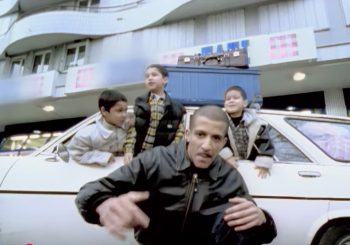Throughout most of my childhood, my family and I traveled from one country to another. I never spent long enough in any one foreign country to call its culture my own, nor did I spend enough time at home to escape the feeling that there was much I was missing out on.
This presented a challenge, but one my parents decided to rise to. Aside from the usual of speaking Arabic at home and visiting every summer, another weapon in their arsenal was the windows they gave my brother and me into the culture and traditions of Egypt. And in our childhood, the crowning jewel among those was El Leila El Kebeera.
El Leila El Kebeera (The Big Night, 1961) – the name given to the peak of the seasonal celebration of the Prophet Mohammed’s birthday – was a treasure my parents held on to from their own childhood. On a cassette tape it traveled with us as far to the east as Tokyo and as far to the west as Washington D.C.
Written in the accessible, yet witty, thoughtful, and sometimes even philosophical style of Egyptian poet Salah Jahine, along with the music of the quintessentially Egyptian composer Sayyed Mekkawy, the operetta was a pillar of my early years.
Listening to it, even without watching the iconic puppet show it premiered as, transports the listener straight into a typical Egyptian mulid. In fact, the entire operetta feels like a walk through one such fairground, catching snippets of conversation, song, vendors’ calls and performances, and Sufi chants, with the spiritual and religious rituals blending in seamless harmony with popular celebration and fun without a hint that the two are in contradiction with each other.
Along that walk the listener meets a myriad of characters that encapsulate the spirit of a mulid. The first voice we hear is that of a man singing fondly and poetically of the chickpeas he is selling to passersby. He is not the only street vendor that appears throughout the operetta either. From freshly fried fish to malban (Turkish delight), stands and carts selling food punctuate the story as it goes along.
The iconic Egyptian Aragouz is also a key voice in the El Leila El Kebeera – he is the first to sing the words of the title. He also provides the watching children with a side-splitting performance, as he pranks a small town mayor asking him for directions.
The recurring character Mes’ed, an ordinary mulid-goer, and his unnamed friend hop from ahwa (a traditional Egyptian café) to ahwa, trying to get away with listening to the live performances of singers like Rayyes Hanteera without spending money on anything to drink, while elsewhere an emcee announces the program of a circus with clowns, lion tamers, and more.
Like any child, I carried within me a fear of getting lost in a crowd and not finding my family. As a result, one of the snippets that are etched deepest in my mind is the song of a mother seeking her lost daughter.
يا ولاد الحلال..بنتي تايهة طول كده
رجلها الشمال فيا خلخال زي ده
Kind people, my daughter is lost, she is about this tall,
On her left foot is an anklet just like this.
Until today when I hear the sadness in the woman’s voice, I find myself wondering if the girl was ever found.
Unfortunately, most of the beauty of El Leila El Kebeera gets entirely lost in translation. Steeped in local culture, the words of the operetta may be found in other languages, but the context and significance behind them and the smoothness and sincerity of Jahine’s rhymes can only fully reach those who are familiar with the Egyptian Arabic dialect.
دول فلاحين ودول صعايدة..دول م الكنال ودول رشايدة
Over there are some from the Delta,
Some for Upper Egypt, the Canal, and some from Rosetta
From the femininity of the song Tar Fel Hawa Shashi and the masculinity of Osta Emara and his claim of being known for his strength – and his subsequent inability to prove it – to the romance of Rayyes Hanteera’s songs and love and spirituality in a chant performed by another mulid-goer who hurried to the fairground after having a beautiful dream of the Prophet Mohamed: El Leila El Kebeera is layered and varied.
I have never been to a mulid myself, not, at least, as far as I recall. But as I listen to the songs of El Leila El Kebeera, the words tumbling out of my mouth as though through muscle memory, I close my eyes and I feel like I am there, sat at a table listening to Rayyes Hanteera singing his love song, or observing the devotion in the Sufi rituals.
A microcosm of Egypt at its most cheerful and wholesome, El Leila El Kebeera has been putting smiles on the faces of Egyptian children and adults for decades. However, its evocative lyrics and unforgettable music are slowly fading from the standard traditions of families across Egypt, a fact that I lament.
Many of my peers who grew up in Egypt are not familiar with El Leila El Keebera, or at least did not have a childhood in which it played a meaningful role. Perhaps parents raising their children at home did not fear any cultural alienation or loss of identity. And in that way, with the help of El Leila El Kebeera, my distance from Egypt may, ironically, have helped bring me closer to it.
Any opinions and viewpoints expressed in this article are exclusively those of the author. To submit an opinion article, please email [email protected].






Comments (5)
[…] Jahine and Sayyed Mekkawy revived it with a highly popular production featuring puppets called El Leila el Kebira, vividly portraying the Mouled or the Egyptian […]
[…] one were attending mawlid el- nabi (Prophet’s birthday) themselves, is the iconic puppet show, El-Leila El-Kebira (The Big Night, 1961), with lyrics written by Egyptian poet Salah Jahin and music by Egyptian […]